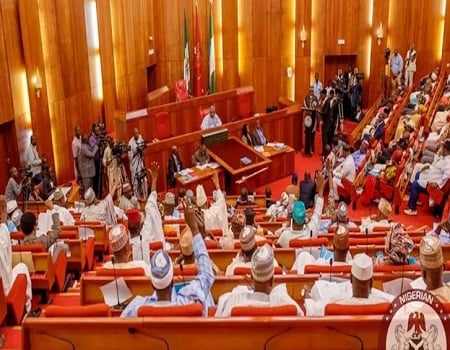Ahead of President Muhammadu Buhari presentation of the 2022 Appropriations Bill to the National Assembly, the Senate on Wednesday passed the 2022-2024 Medium Term Expenditure Framework and Fiscal Strategy Paper (MTEF/FSP).
The Senate at its sitting last July before it proceeded on its vacation, received the document from President Buhari and consequently mandated its Committee if Finance, National Planning and Economic Affairs; Foreign and Local Debts; Banking, Insurance and Other Financial Institutions; Petroleum Resources (Upstream); Downstream Petroleum Sector and Gas for further legislative actions.
Checks revealed that the MTEF/FSP is a major feature of the annual budget preparation cycle as it provides the basic structure for the estimates and assumptions that underlie the annual budgets.
Considering the report presented by Senator representing Lagos West and Chairman of the Senate Committee on Finance, Olamilekan Adeola, the Senate approved virtually all the assumptions of the federal government for the 2022 Budget.
The Red Chamber gave its nod to the revenue projection of N8.36 trillion; and proposed expenditure of N13.98 trillion.
It also approved the daily crude oil production of 1.88mbpd, 2.23mbpd, and 2.22mbpd for 2022, 2023 and 2024, particularly “in view of average 1.93mbpd over the last 3 years and the fact that a very conservative oil output benchmark has been adopted for the medium term in order to ensure greater budget realism.”
The lawmakers also approved the Benchmark oil price of USD$57 per barrel; adopted the Exchange Rate of N410.15/US$ by the Executive for 2022-2024, and gave its nod to the projected Gross Domestic Product (GDP) growth rate of 4.20%; as well as 13% inflation rate.
The upper legislative chamber retained a fiscal deficit of N5.62 trillion; new borrowings of N4.89 trillion – an amount which includes Foreign and Domestic borrowing – subject to the provision of details of the borrowing plan to the National Assembly.
The Senate also approved other parameters such as Statutory transfers totalling N613.4 billion; Debt Service estimate of N3.12 trillion; Sinking Fund to the tune of N292 billion; Pension, Gratuities and Retirees Benefits of N567 billion.
Out of the Aggregate Federal Government’s Expenditure of N13.98 trillion, the upper chamber approved the sum of N6.12 trillion for Total Recurrent (Non-debt); N3.47 trillion as Personnel Cost for Ministries, Departments and Agencies (MDAs); N3.26 trillion for Capital Expenditure (exclusive transfers); N350 billion Special Intervention (Recurrent); and N10 billion for Special Intervention (Capital).
The upper chamber however made certain landmark recommendations. They called on the Salaries and Wages Commission to review the salary structure of all Ministries, Departments and Agencies (MDAs), in other to come up with a new salary structure that will reflect the true financial position of the Agencies.
The lawmakers also demanded a continuous review of the Fiscal Responsibility Act to ensure that all revenues are remitted to the Consolidated Revenue Fund (CRF) as at when due, in order to curtail frivolous deductions and diversion of funds by the MDAs.
They argued that all laws relating to mining businesses be reviewed as a matter of urgency, to ensure upward review of rates applied to royalties, ground rent and licenses renewal of all mining companies operating in Nigeria to ensure transparency in the collection of revenue by relevant agencies, as well as recommend stringent sanctions in proposed new laws to address illegal mining.
The Senate amid its recommendations also called on the Nigeria Customs Service to accelerate the process of installing scanners at all ports across the country to curb the issues of smuggling and underpayment of customs duties on imported goods which has resulted in a huge loss of revenue to the government.
They equally called on the Federal Government to urgently implement the Petroleum Industry Act recently assented to by the President in order to curtail the problems of smuggling and round-tripping of petroleum products imported into the country.
In addition, the chamber recommended that the proposed budget of Government Owned Enterprises (GOEs) be reviewed upward to show the reflection of their capabilities to generate more revenue as a result of the findings of the Joint Committee.
Consequently, it further recommended that the offices of the Accountant General (AGF), Auditor General of the Federation (AuGF) and Fiscal Responsibility Commission be strengthened in the area of staffing and proper funding of its activities to ensure optimal performance of their duties in order to adequately monitor the remittances of all government revenue.
The chamber posited that the Act establishing some MDAs such as – Nigeria Investment Promotion Council (NIPC), National Lottery Trust Fund Act, Bank of Industry Act, Bank of Agriculture Act, Energy Commission Act and Nigeria Nuclear Regulatory Commission – if reviewed and amended as a matter of urgency, would assist to generate more revenue to the coffers of government.
It also recommended that the Federal Government budget be reviewed and purged of some agencies with demonstrated capacity to stand on their own without any recourse to the Federal Government of Nigeria budget. They cited as examples, the National Agency for Food and Drug Administration and Control (NAFDAC) and Nigerian College of Aviation Technology, Zaria.
YOU SHOULD NOT MISS THESE HEADLINES FROM NIGERIAN TRIBUNE
Buhari Urges MTN For Quality Service, Downward Price Review In Cost Of Data, Other Services
President Muhammadu Buhari Friday at State House Abuja urged the MTN Group to make the available top-of-the-range service to its Nigerian subscribers… Senate passes 2022-2024 MTEF/FSP, approves FG N13.98trn budget projection for 2022 Senate passes 2022-2024 MTEF/FSP, approves FG N13.98trn budget projection for 2022 Senate passes 2022-2024 MTEF/FSP, approves FG N13.98trn budget projection for 2022 Senate passes 2022-2024 MTEF/FSP, approves FG N13.98trn budget projection for 2022.




